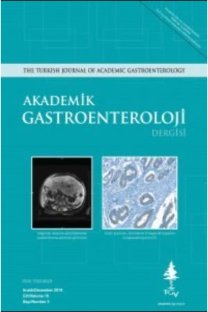İnflamatuvar barsak hastalıklarında anemi ve serum eritropoietin düzeyleri
Giriş ve Amaç: Anemi inflamatuvar barsak hastalığı olan hastalar için önemli bir problem olup, primer hastalığın prognozunu, tedaviye yanıtı, hastanın yaşam kalitesini önemli ölçüde etkiler. Çalışmamı zda Ülseratif kolit ve Crohn hastalığı olan olgularda anemiye eritropoietin yanıtını ve bu yanıt üzerine etkili olabilecek faktörleri araştırmayı hedefledik. Gereç ve Yöntem: 106 inflamatuvar barsak hastası, bu dönemde Gastroenteroloji Servisi Yoğun Bakım Ünitesinde izlenen 39 akut gastrointestinal sistem kanamalı hasta ile 16 gönüllü sağlıklı kişi incelenmiştir. Ülseratif kolit hastaları lokalizasyonları na göre 3 grupta incelenmişlerdir. Hastalığın şiddeti Rachmilewitz Endoskopik Aktivite İndeksi ile belirlenmiştir. Crohn hastaları lokalizasyonlarına göre 3 grupta incelenmişlerdir. Hastalığın şiddeti CDAI kriterlerine göre belirlenmiştir. Tüm hasta grubunda demir eksikliği anemisi ve kronik hastalık anemisi olanlarda serum eritropoietin düzeyleri ELİSA yöntemi ile ölçülmüştür. Bulgular: Sağlıklı kontrol grubu ile Ülseratif kolit, Crohn hastalığı ve GİS Kanamalı gruplar arasında eritropoietin ve hemoglobin değerleri açısından istatistiksel olarak anlamlı fark saptandı. (p0,05). Ülseratif kolit hastalarında hemoglobin düzeyi düştüğü halde eritropoietin düzeyi artmaz iken Crohn hastalarında anemik olgularda hemoglobin düzeyi düşer iken eritropoietin düzeyi artıyordu. Sonuç: Sonuç olarak inflamatuvar barsak hastalığı olan olgularda anemiye eritropoietin yanıtını incelediğimiz araştırmamızda, Crohn hastalığı-kronik hastalık anemisi grubunda anemiye baskılı eritropoietin yanıtı olduğunu tespit ettik.
Anemia and serum erythropoietin levels in patients with inflammatory bowel disease
Background and Aims: Anemia is an important problem in patients with inflammatory bowel disease, affecting the prognosis, response to treatment and quality of life of the patients. In this study, we aimed to investigate the response of erythropoietin to anemia in patients with ulcerative colitis and Crohn's disease and to determine the factors that might be operative in this response. Materials and Methods: A total of 106 patients with inflammatory bowel disease along with 36 patients with acute gastrointestinal hemorrhage and 16 healthy volunteers were evaluated in this study. Patients with ulcerative colitis were divided into three groups according to the disease localization, and the severity of the disease was recorded according to the Rachmilewitz endoscopic activity index. Similarly, patients with Crohn's disease were divided into three groups according to the disease localization, and the severity of the disease was recorded according to the Crohn's Disease Activity Index (CDAI) criteria. Serum erythropoietin levels were analyzed by ELISA technique. Results: No statistically significant differences were determined between patient groups and controls with respect to erythropoietin and hemoglobin levels. There was a reverse relation between the erythropoietin and hemoglobin levels in patients with Crohn's disease (r= -0.352, p=0.011), and no correlation was found in patients with ulcerative colitis. The hemoglobin and erythropoietin levels were not statistically different in the active and remission groups of the patients with anemia (p>0.05). The erythropoietin levels were not increased in ulcerative colitis patients with anemia but were increased in patients with Crohn's disease. Conclusions: In our study evaluating the erythropoietin response to anemia in inflammatory bowel disease, patients with Crohn's disease were shown to have a reduced erythropoietin response to chronic anemia.
